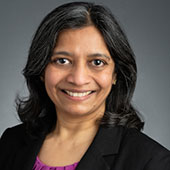Series to Highlight Women in Signal Processing: Nita Patel


Nita Patel
Nita Patel is a Senior Director, Engineering at L3Harris Technologies. L3Harris is an agile, global aerospace and defense technology innovator, delivering end-to-end solutions that meet customers' mission-critical needs. Ms. Patel's business area of focus is advanced electro-optical and night vision systems using image and signal processing algorithms. She was named the 2014 L3 Engineer of the Year and the 2011 New Hampshire Engineer of the Year award for her technical contributions to the engineering profession.
We approached her with a few questions.
I am currently a Director on the IEEE Foundation board. In my over twenty-five years as an IEEE volunteer, I have served as 1st VP Computer Society, served a three-year term on the Computer Society Board of Governors, founded and led the first five years of the IEEE Women in Engineering International Leadership Conference (WIE ILC), served as Women in Engineering International Chair for which I received the 2014 Larry K Wilson Transnational Award for distinguished contributions to IEEE global activities, served on the Eta Kappa Nu Board of Governors and was IEEE-USA VP of Communications & Public Awareness.
Outside of IEEE, I am active with Toastmasters (Toastmasters of Manchester, Amoskeag Better Communicators, and Millyard Toastmasters) and am a Senior Tournament Director for the United States Chess Federation. I received my MS Computer Engineering (1998), BS Electrical Engineering (1995), and BS Mathematics (1995) from Southern Methodist University in Dallas.
Q. How does your work affect society?
I have worked in the defense industry for the majority of my career. Providing equipment to enable the security of those defending my freedom is incredibly humbling. For about six years, I was chief engineer for the NEXRAD weather radar upgrade. We revolutionized the signal processing in the radar network to increase the determination of the radar signature, predict storms, and optimize warnings/alerts. This had an impact on society by giving people more warning time for tornadoes, identifying snow versus rain, or providing hail detection. I distinctly remember getting a note from a meteorologist saying that the new processing allowed him to detect a tornado that would not have been identified before and allowed a town to be evacuated savings lives. That was very impactful. I think all engineering affects society. Each of us is advancing knowledge and the application of technology for the benefit of society when we bring forward a new idea or a new way of accomplishing an old idea. Engineers are uniquely positioned to help society solve complex problems. I think that's incredibly meaningful.
Q. What challenges you had to face to get where you are today?
I think I have been incredibly fortunate. My challenges are not those of defying a society preventing me from getting an education, rising past poverty, or overcoming physical/emotional hardships. I have a supportive family, access to thought-encouraging academics, and no worries about the basic necessities such as food, shelter, or health. My challenges have been those of struggling through a brain-stumping semester of partial differential equations, figuring out how to convince committees of my ideas, or choosing priorities between different elements of my life. I think all challenges, big or small, can be tackled with a growth mindset, grit and a bit of self-awareness.
Q. What advice would you give to scientists/engineers in signal processing?
Signal processing is such a fun and powerful discipline of engineering. The ability to translate the sensory, material world into meaningful data is amazing to me. Signal processing is the intersection of human and digital space in that it takes raw sensor data (e.g., voice, touch, visual) and turns that into meaningful information. Being able to enhance a person's capabilities by synthesizing data, accelerating decisions, melding disparate information, or optimizing their senses is an important and weighty responsibility. I'd advise scientists/engineers to have fun and dream the impossible but also consider the impact of our work.
Q. Anything else that you would like to add?
Enjoy what you do and do what you enjoy. The first is much harder than the latter but both are critical to finding success in your life's journey.

